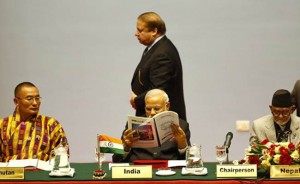SAARC Proves a Mega-Flop Depends Now on Pakistan?
 KATHMANDU: Whether the SAARC Summit that wraps up today in Kathmandu will prove a mega-flop depends now on Pakistan. It alone among the eight member countries has objected to three major agreements that aim at promoting cross-border trade, which remains minimal between SAARC countries.
KATHMANDU: Whether the SAARC Summit that wraps up today in Kathmandu will prove a mega-flop depends now on Pakistan. It alone among the eight member countries has objected to three major agreements that aim at promoting cross-border trade, which remains minimal between SAARC countries.
On Wednesday, Pakistan blocked key proposals backed by India and other countries to integrate energy grids and free up road and rail movement. Countries like Nepal are now trying to persuade Pakistani Prime Minister Nawaz Sharif to give his assent; the lobbying is expected to continue at an informal retreat that will be held today at Dhulikhel just outside Kathmandu.
Indian spokespersons have said they are “disappointed” with Pakistan’s stalling of the deals. When Prime Minister Narendra Modi addressed the SAARC summit yesterday morning, his assessment of the group’s accomplishments was frank. “As SAARC we have failed to move with the speed that our people expect and want. Nowhere in the world are collective efforts more urgent than in South Asia; and, nowhere else is it so modest,” Mr Modi said.
An hour later came the news that the summit was dangerously close to a finish that would prove exactly that.In its 30 years, the South Asian Association for Regional Cooperation (SAARC) has delivered negligible results for economic ties and development among its eight members – Afghanistan, Bangladesh, Bhutan, India, the Maldives, Nepal, Pakistan and Sri Lanka.
Despite a free trade pact since 2006, South Asian nations conduct only 5 per cent of their total trade with each other, and there are few transport and power links among them.
Experts agree that cooperation between New Delhi and Islamabad is key to the success of SAARC. This gathering comes just weeks after some of the worst cross-border violence in Kashmir – 20 civilians were killed last month. Mr Modi is holding meetings on the sidelines of the summit with all SAARC leaders except Mr Sharif

